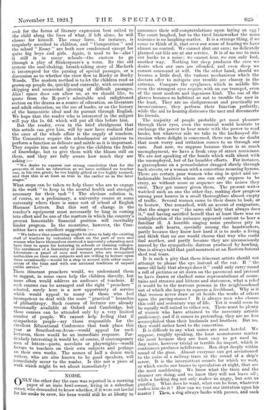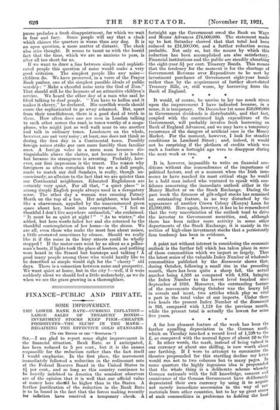NOISE. O NLY the other day the case was reported in
a morning paper of an irate fowl-owner, living in a suburban street, who demanded to know whether, if it were not lawful for his cooks to crow, his hens would still be at liberty to announce their self-congratulations upon laying an egg ? The court laughed, but to the tired brainworker the noise nuisance is no laughing-matter. It is a strange thing, if we come to think of it, that over our sense of hearing we have almost no control. We cannot shut our ears ; no delicately planned ear-lids are at our service. It is of no use to turn our backs to a noise ; we cannot hear, we can only Igok, another way. Nothing but sleep produces the ease we desire when our cars are offended, and even sleep we cannot command at will. On the other hand, should we become a little deaf, the various mechanisms which the doctors offer to mitigate our trouble are clumsy in the extreme. Compare the eyeglasses, which in middle life even the strongest eyes require, with an ear trumpet, even of the most modern and ingenious kind. The use of the glasses becomes so habitual as not to trouble the user in the least. They are no disfigurement and practically no inconvenience, they perform their function perfectly, while the aid to hearing distresses the user and disconcerts his friends.
The majority of people probably get most pleasure through their eyes, even the musical would hesitate to exchange the power to hear music with the power to read books, but whatever side we take in the hackneyed dis- cussion where delight is concerned, there can be no doubt that most worry and irritation comes to us through our ears. Just now, we suppose because there is so much unemployment, we have a fresh crop of street musicians. We are not speaking of the bands which walk about with the unemployed, but of far humbler efforts. For instance, a gramophone on a perambulator dragged slowly through back streets, or a woman with a concertina moaning hymns. There are certain poor women who sing in quiet and un- fashionable localities whom one can only suppose to be crazy, so without sense or sequence are the noises they emit. They get money given them. The present writer watched such an one the other day, making slow progress among poor houses in a small thoroughfare almost empty of traffic. Several women came to their doors to look, or to bestow. One remarked, with an accent of resignation, that the singer was " the same old lady that always does it," and having satisfied herself that at least there was no multiplication of the nuisance appeared content to bear a familiar ill. A horrible singing noise produces pity in certain soft hearts, specially among the handworkers, partly because they know how hard it is to make a living and think that no one would choose that way who could find another, and partly because they are unconsciously moved by the sympathetic distress produced by howling. One is always told that paid mourners at an Eastern funeral shed real tears.
It is such a pity that these itinerant artists should not attempt to please the eye instead of the ear. If " the same old lady that always does it " could only carry round a roll of pictures or sit down on the pavement and pretend to have drawn or chalked some representations, of moun- tains and streams and kittens and statesmen, what a relief it would be to the nervous persons in the neighbourhood out of which she hopes to squeeze a livelihood. Why is it that women never draw or sit beside the works of others upon the paving-stones ? It is always men who choose this cold and sedentary way of life. Yet it would seem to be equally well-suited to either sex. There must be plenty of women who have attained to the necessary artistic proficiency, and if it comes to pretending, they are no less accomplished than their husbands and brothers. But no, they would rather howl to the concertina. It is difficult to say what noises arc most hateful. We suppose, roughly speaking, the least monotonous matter the most because they are least easy to get used to. Any noise, however trivial or terrible its import, which is continuous produces indifference. Men slept deeply within sound of the guns. Almost everyone can get accustomed to the noise of a railway train or the sound of a ship's screw. It is the intermittent sounds for which we wait, or which excite our brains to speculation at night, that are the most maddening. We know what the train and the steamer are doing, and we know they will not leave off ; while a barking dog not only makes us angry, but sets us puzzling. What does he want, what can he hear, whatever makes him do it ? How can we vent our irritation upon his master I Then, a dog always barks with pauses, and each pause preludes a fresh disappointment, for which we wait in fear and fury. Some people will say that a clock which chimes the quarters is worse than any dog. It is an open question, a mere matter of distaste. The clock also stirs thought. It seems to taunt us with the horrid fact that the time, which we are so anxious to pass, is after all too short for us.
If we want to draw a line between simple .and sophisti- cated people this question of noise would make a very good critefion. The simplest people like any noise— children do. We have preserved, in a verse of the Prayer Book psalms, one of the simplest possible ideals of public worship : " Make a cheerful noise unto the God of Zion." That ,should still be the keynote of an attractive children's service. We heard the other day of a man who said he liked talking to deaf people. " You have to holloa and it makes it cheery," he declared. His unselfish words should cause the sophisticated to go away ashamed. But, apart from their unselfishness, there is a good deal of truth in them. How often does one see men in London talking to each other across the road, in tones-worthy of a mega- phone, who might just as well walk near to one another and talk in ordinary tones. Londoners on the whole, however, are not very noisy ; at least, one does not think so during the first day in a Continental town. Possibly foreign noises strike our ears more forcibly than familiar ones. A foreign voice in a room soon becomes dis- tinguishable above the clatter, not because it is louder, but because its strangeness is arresting. Probably, how- ever, our first impression is the truest. The reason why foreigners so often complain that we are a dull people, made to match our dull Sundays, is really, though un- consciously, an allusion to the fact that we are quieter than our Continental neighbours. Educated Englishmen are certainly very quiet. For all that, " a quiet place " is among simple English people always used in a derogatory sense. The other day a woman was crossing Putney Heath on the top of a bus. Her neighbour, who looked like a charwoman, appalled by the unaccustomed green space about her, burst into conversation. " I feel so thankful I don't live anywhere outlandish," she exclaimed. " It must be so quiet at night ! " " As to winter," she added, but here words failed her and she returned to the thankful contemplation of her home—in the slums. We are all, even those who make the most fuss about noises, a little overawed sometimes by silence. Should we really like it if the noise in the busy streets could be wholly stopped ? If the motor-cars went by as silent as a pOlice- man's boots, if lights took the place of hooters, and nothing were heard in the Strand but footsteps and talking ? A good many people among those who would hardly like to be described as simple would sigh for the " cheery " old days. There is a connexion between noise and prosperity. We want quiet at home, but in the city ?—well, if it were suddenly silent we should feel a little melancholy, as we do when we see the grass growing in a thoroughfare.







































 Previous page
Previous page